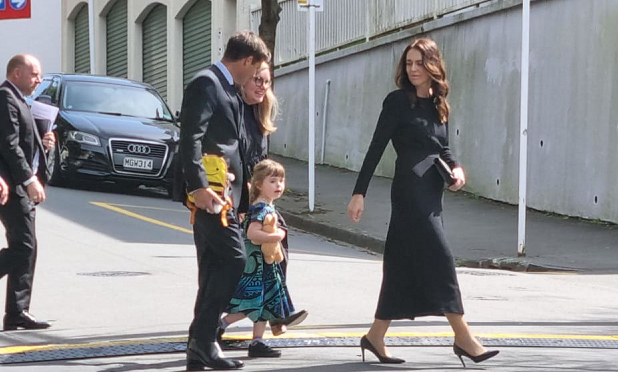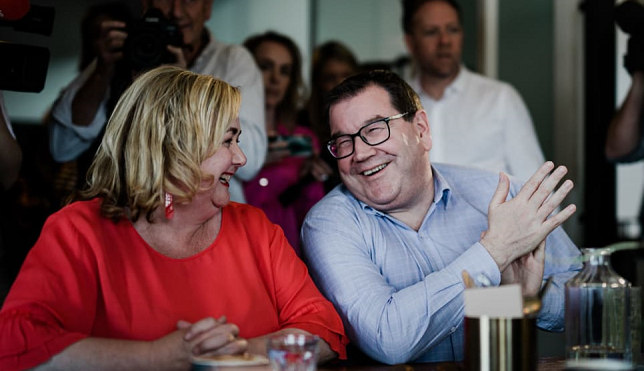Power Play: Tough task ahead for Labour as it seeks re-election without Ardern at helm
RNZ
19 January 2023, 6:06 AM
 Deputy Prime Minister Grant Robertson, Jacinda Ardern and Health Minister Chris Hipkins. Photo: RNZ / Dom Thomas
Deputy Prime Minister Grant Robertson, Jacinda Ardern and Health Minister Chris Hipkins. Photo: RNZ / Dom ThomasPower Play - The political world is reeling with the news of Jacinda Ardern's shock resignation, with the hunt now on for a new Labour leader and prime minister.
Ardern had promised to kick off the year with a reset but her announcement surpassed all expectations.
The prospect of a fractious election year and fighting an uphill battle against hardening public sentiment was obviously too much; the personal impact of the attacks and vitriol aimed at Ardern and her family, and milestones like her daughter Neve preparing to start school - all contributing factors.
Entering her sixth year as prime minister and with Labour eyeing a third term, Ardern was arguably still Labour's best asset and best shot at re-election. However, it was always going to be a huge
ask to reverse her plummeting popularity, amid the feeling the electorate had heard enough from her over the intense two terms she governed, worsened by misinformation laced with misogyny.
There is justifiable scrutiny on the record of Labour in government and whether it has lived up to its big promises on delivering better housing, a better way of life, and a New Zealand where wealth and prosperity are more equally shared - that failure, or success, will be Ardern's legacy, as will her response to tragedies like the 15 March attacks and the Whakaari/White Island eruption.

Ardern says she is looking forward to being with her daughter Neve, when she starts school this year and finally marrying her partner, Clarke Gayford. Photo: RNZ/ Krystal Gibbens
After being widely praised for the first Covid-19 response, the pandemic has once again proved a malignant political force, a factor in bringing an end to yet another high profile career. The combined pressures of leading the country through some incredibly tough years, and the backlash it has created in some quarters have added another dimension to the burden carried by prime ministers.
Ardern's resignation was the election year bombshell few really expected, but this way it gives time for a new leader to settle into the job, get some profile, and stamp their mark on the ministerial line-up and policy programme that are both set for a refresh.
She will resign no later than 7 February, having laid the way for a swift transition, giving the caucus time to come up with a candidate more than two-thirds of its MPs can throw their support behind. If not then it goes out to the membership.
Deputy prime minister, finance minister and close friend of Ardern, Grant Robertson, would have been seen as a natural successor but has already ruled out a tilt at the top job. "Intense and proud" was how he described the atmosphere in the room after Ardern's announcement, and "also a sense that we want to carry on".
In order to do the job of prime minister, you had to commit to it 100 percent, said Robertson when asked why he did not want the job.
"I'm very proud and happy to be the minister of finance but in 2014, I said I would not run again for the Labour Party leadership and I haven't changed my mind on that."

Deputy prime minister Grant Robertson (right) has ruled himself out for leading Labour but Megan Woods is one of the potential candidates. Photo: RNZ / Dom Thomas
That leaves the likes of Michael Wood, Megan Woods and Kiri Allan as potential candidates, however Chris Hipkins is shaping up to be an early favourite. Robertson is still deputy prime minister but having two pākehā men from Wellington in the leadership may prompt conversations about more diverse ethnic and regional representation, and the make-up of the leadership team will no doubt be part of MPs' considerations.
Hipkins has proved himself as competent and capable as a senior minister, most notably as the minister responsible for the Covid-19 response, and has not ruled himself out. Today, he was urging people take "time to digest" what has happened, predicting a "good constructive discussion" before selecting a new leader.
"Leadership contests don't have to be like the Hunger Games as the National Party seem to have perfected the art of, it is actually possible to do it differently and that's what we'll be striving to do,"
he told reporters at the party's retreat in Napier.
Can Labour still win the election? "Absolutely, we're in this to win this," insists Hipkins.
"Of course," says Robertson. "Labour's got the policies, the experience and the credibility to win."
"Bloody oath, absolutely," from his colleague Kieran McNulty.
Labour MPs are putting on a brave face as they realise their job this election just got that much harder.

![‘We’re getting our pool’: Roxburgh community sees project through [video]](https://d3hbehni9j4crp.cloudfront.net/listHeaderLargeComponents/63c775aef9ff5b002cc3c086/header_images/header_Roxburgh%20Pool.png)



